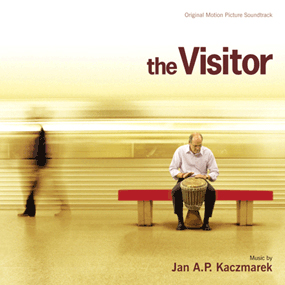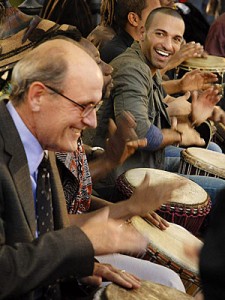
Last year’s Oscars were all about the dark and the tragic with No Country for Old Men and There Will be Blood going home with some of the top nods (two of my favorite movies last year, by the way). This year’s Oscars were more light-hearted—there wasn’t much of the tragic with Brad Pitt as Benjamin Button or with the runaway indie hit, and Oscar’s little darling Slumdog Millionaire. There was, however, one nomination this year for best actor that, if you weren’t paying attention, was easy to overlook.
Richard Jenkins, who played the dead father in HBO’s Six Feet Under, stars in one of last year’s best films, The Visitor. This is Jenkins’ first major lead as he’s been playing supporting or character TV roles for the last thirty or so years (most recently as the gym manager in Burn After Reading). Jenkins plays Professor Walter Vale, a quiet, self-loathing, and eminently bored economics professor who’s entirely dissatisfied with his life. Widowed, Vale spends his down time trying to learn the piano in an effort to emulate his late wife, a classical concert pianist. He’s been giving the same lectures for years on end, just changing the date on them so that nobody catches on.
By a turn of events, his department head forces him to go to an academic conference to read a paper he nominally co-authored (which he hadn’t even read!) when the primary author backs out. When Walter arrives at the apartment he maintains in Manhattan, he’s startled to discover a young couple living there. The young man Tarek, a Syrian djembe drum player and his girlfriend Zainab, a Senegalese jewelry maker were conned into subletting his apartment and were equally surprised by this intrusion! In an act that shocks Walter as much as it does Tarek and Zainab, he asks them to stay while they figure things out.
A friendship ensues between Walter and Tarek over the next few days. Tarek teaches Walter to play the djembe drum and, in one of the most poignant scenes of the film, they both join a drum circle in Central Park. On one occasion as the pair travel the subway with their drums in hand, Tarek is mistakenly charged (profiled?) with turnstile jumping (not paying for the subway) and is arrested. The thing is, Tarek along with Zainab (and as we learn later, Tarek’s mother, Mouna) is an illegal immigrant. He is held in a detention center downtown and Walter finds a new energy in his life as he advocates for Tarek, hires an immigration lawyer and befriends Tarek’s mother. Walter and Mouna being to develop a deep friendship as together they await Tarek’s fate.

While this movie deals with the larger realities of immigration, identity, and cross-cultural communication, it is, at bottom, a movie about radical hospitality. Walter learns the truth of his life when he steps into somebody else’s, or rather, when they step into his. As the church, in our geo-political, post-9/11 reality, we hear much about the immigration “problem”. Tersely, these so-called problems—an increase in crime, an increase in job losses, an increase in language barriers (to name a few)—are said to accompany the rise in immigration. Tom McCarthy, the writer and director of the film, doesn’t tip-toe around this, but rather puts the issue right into the space that Walter rightfully ought to occupy—his own apartment!—and so throws the issue of the ‘other’ into sharp relief, bringing it right to our doorstep.
Walter has two options available to him: security or the vulnerability of hospitality. He can call the police; he can secure his home against the otherness and all the difference that accompanies the intrusion. Or he can embrace the difference; he can accept the otherness of the intrusion and so witness the transformation of the other into a neighbour, into a friend. Indeed this is what happens and Walter learns that this transformation is not only objective—that these people have turned into his neighbours—but entirely subjective as well, as he realizes that he has become a neighbour; he himself transforms into a friend to these strangers. That’s what the practice of hospitality does.
Christ’s call to neighbour-love is a call to radical hospitality in all its messiness; it’s a call to welcome the stranger to our table, to Christ’s table, no matter what the barrier might be. Now this might sound cliché and somewhat overstated, but when we have an analogy of the church in the figure of Walter Vale played out for us on the screen, this cliché gets some traction.
The church, in its everyday existence—the church of parking lots and potluck suppers (to borrow a phrase from Stanley Hauerwas)—continually wavers between extending hospitality and an illegitimate concern over its own security. The church, with its narcissistic tendencies, tries again and again to protect itself against the intrusion of the stranger, against the presence of the different. We tend to circle the wagons, as it were, around our little corner of the truth. When we do this we obscure our witness; when we sit in self-concern, we block out the presence of the crucified Christ—we simply deny that the Kingdom of God is come. Yet, when the church opens itself to the messiness of hospitality, the Kingdom is played out in the middle of our messes. This movie embodies that openness and so is a wonderful analogy of God’s reign among us.
